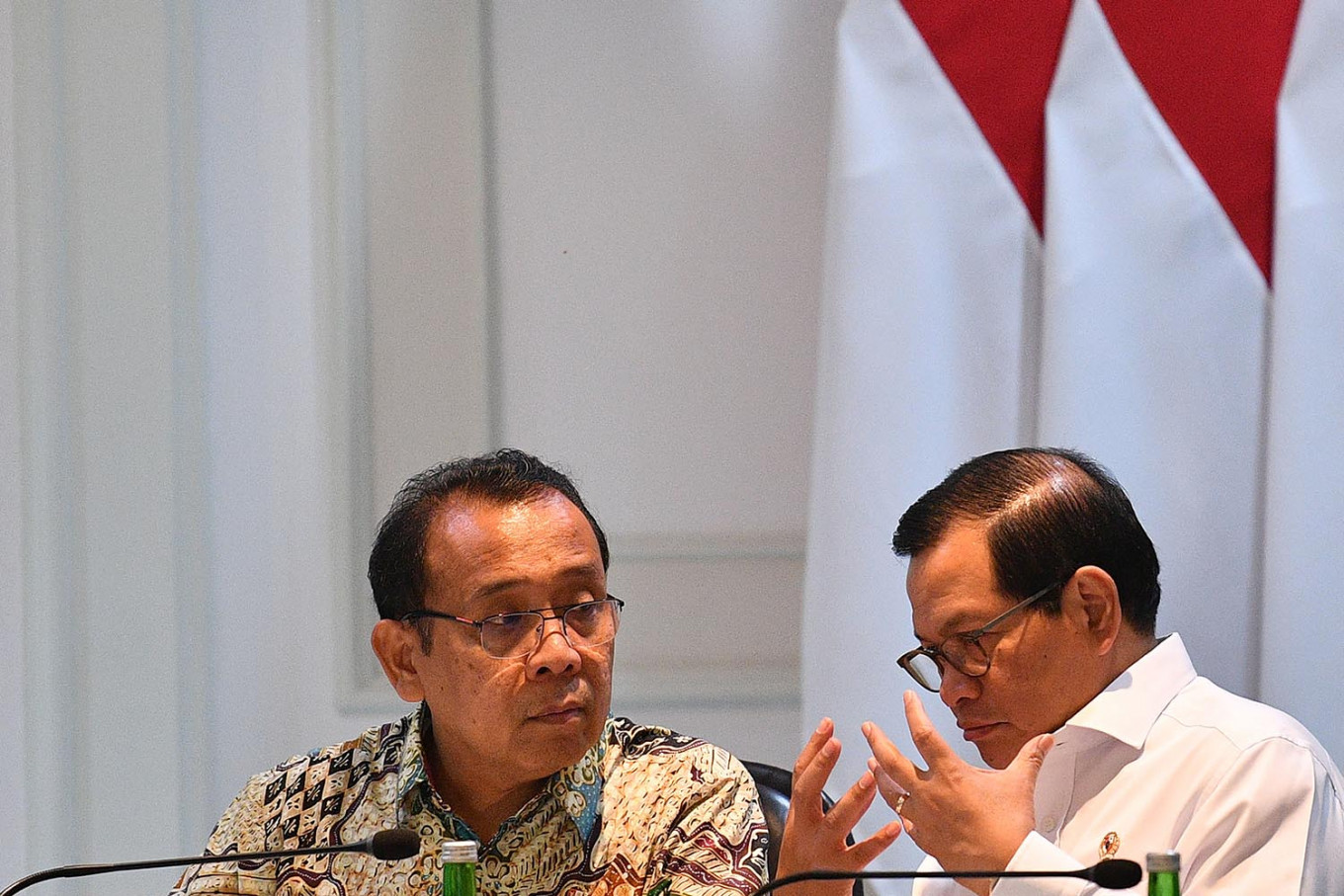Popular Reads
Top Results
Can't find what you're looking for?
View all search resultsPopular Reads
Top Results
Can't find what you're looking for?
View all search resultsBe more coherent with COVID-19 announcements, analysts tell Jokowi
The central government could use a more coherent public communication strategy as it looks to address the COVID-19 outbreak in the country, with analysts pointing to deepening frustrations over mixed messages and a failure to effectively convey the seriousness of the situation.
Change text size
Gift Premium Articles
to Anyone
The central government could use a more coherent public communication strategy as it looks to address the COVID-19 outbreak in the country, with analysts pointing to deepening frustrations over mixed messages and a failure to effectively convey the seriousness of the situation.
Indonesia’s government is coming under increasing pressure to provide transparency and access to information to combat the outbreak, as it scrambles to run an effective crisis response, keep the region’s largest economy afloat and ensure that public order and calm is sustained.
One unusual feature of the coronavirus response has been the growing prevalence of officials contradicting one another in public, which has caused confusion in local efforts to curb a pandemic that has seen some 1.6 million people infected and more than 80,000 deaths globally.
After a Cabinet meeting on April 2, presidential spokesperson Fadjroel Rachman released a statement insisting there would be no official ban on the mudik (exodus), the almost annual tradition of millions of Indonesians visiting their hometowns for the Idul Fitri holidays.
Travelers, he said, should instead self-isolate for the recommended two-week period and would in the meantime be placed under general observation (ODP) when they arrive in their hometowns.
Later that day, State Secretary Pratikno sought to clarify Fadjroel’s statement, saying President Joko “Jokowi” Widodo had actually called on the people not to go back to their hometowns, although he did not categorically state that the President would ban the mudik this year.
Later still it was reported that Jokowi said the government had advised people not to return to their hometowns for Idul Fitri in order to contain the spread of the coronavirus. But he again stopped short of issuing stricter orders to prevent people from mobilizing, calling instead for greater community oversight at the village level to observe recent arrivals from Greater Jakarta.
After Pratikno waded into the conversation, Fadjroel revised his statement to advise people not to return to their hometowns and added a point about social assistance for informal workers, many of whom have lost their source of income as economic activities slowed in the capital.
The statements emerged after Jokowi declared a public health emergency on March 31 and opted for large-scale social restrictions (PSBB) over a territorial quarantine as his preferred method of containing COVID-19.
He has since offered cash payouts to the most vulnerable people and shifted the Idul Fitri holiday leave period to the end of the year in the hope of getting people to stay put, experts say.
It is hardly the first time officials have been caught contradicting one another in public, but the current lapse during a time of crisis made it clear that a communication protocol was needed, said Arya Fernandes, political researcher at the Centre for Strategic International Studies (CSIS).
“It is important for the State Palace to prepare a communication protocol for times of crisis. The public needs trustworthy and sound information that will inspire more trust in the government,” Arya said on Wednesday.
On a separate occasion on April 3, presidential expert staff member Ali Mochtar Ngabalin from the Executive Office of the President disclosed to the media that one of its officials had contracted COVID-19. The statement was later corrected by Juri Ardiantoro, acting undersecretary for political information and communication at the Executive Office.
In a statement, Juri confirmed that employees of the office had tested positive for the disease in a rapid test, but a later polymerase chain reaction (PCR) test, considered to be more reliable, turned out negative.
Presidential Chief of Staff Moeldoko did not immediately respond to a request for comment.
The confusion caused by these officials indicated that the formulated policies were still rough around the edges, Arya said, suggesting that a clear chain of command in communications would help convey the government’s messages with greater clarity.
The President has no shortage of spokespersons, aides and stand-ins. Besides Fadjroel and Pratikno, Jokowi still has Cabinet Secretary Pramono Anung, a former House of Representatives deputy speaker. He also has Moeldoko, Juri and Ali Mochtar at the Executive Office of the President, as well as Foreign Minister Retno Marsudi to speak on international affairs.
Jokowi’s own admission in mid-March that the government was deliberately holding back information on COVID-19 cases from the public did not increase its credibility in handling the outbreak, said Kunto Adi Wibobo, executive director of local pollster KedaiKOPI.
“Without accurate data, the concern is that the public could be lulled into a false sense of security while we might in actuality be sitting in an emergency [situation],” Kunto told The Jakarta Post.
To minimize the potential for future misunderstandings, Kunto said, Jokowi should take the charge in conveying government policy and action in the fight against COVID-19, including by shedding light on the motivations behind certain policy decisions.
As of Thursday afternoon, all but one province in Indonesia have confirmed cases of the disease. The government tally of COVID-19 cases has reached 3,293 infections, 280 deaths and 252 recoveries.










